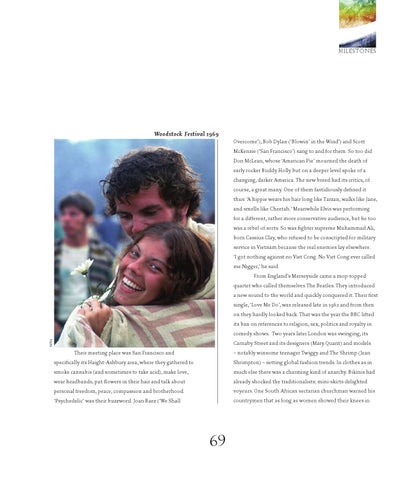MILESTONES
Woodstock Festival 1969 Overcome’), Bob Dylan (‘Blowin’ in the Wind’) and Scott McKenzie (‘San Francisco’) sang to and for them. So too did Don McLean, whose ‘American Pie’ mourned the death of early rocker Buddy Holly but on a deeper level spoke of a changing, darker America. The new breed had its critics, of course, a great many. One of them fastidiously defined it thus: ‘A hippie wears his hair long like Tarzan, walks like Jane, and smells like Cheetah.’ Meanwhile Elvis was performing for a different, rather more conservative audience, but he too was a rebel of sorts. So was fighter supreme Muhammad Ali, born Cassius Clay, who refused to be conscripted for military service in Vietnam because the real enemies lay elsewhere. ‘I got nothing against no Viet Cong. No Viet Cong ever called me Nigger,’ he said.
From England’s Merseyside came a mop-topped
quartet who called themselves The Beatles. They introduced a new sound to the world and quickly conquered it. Their first single, ‘Love Me Do’, was released late in 1962 and from then on they hardly looked back. That was the year the BBC lifted its ban on references to religion, sex, politics and royalty in INPRA
comedy shows. Two years later London was swinging, its Carnaby Street and its designers (Mary Quant) and models Their meeting place was San Francisco and
– notably winsome teenager Twiggy and The Shrimp (Jean
specifically its Haight-Ashbury area, where they gathered to
Shrimpton) – setting global fashion trends. In clothes as in
smoke cannabis (and sometimes to take acid), make love,
much else there was a charming kind of anarchy. Bikinis had
wear headbands, put flowers in their hair and talk about
already shocked the traditionalists; mini-skirts delighted
personal freedom, peace, compassion and brotherhood.
voyeurs. One South African sectarian churchman warned his
‘Psychedelic’ was their buzzword. Joan Baez (‘We Shall
countrymen that as long as women showed their knees in
69 man_times03.indd 39
12/2/08 12:23:52 PM
